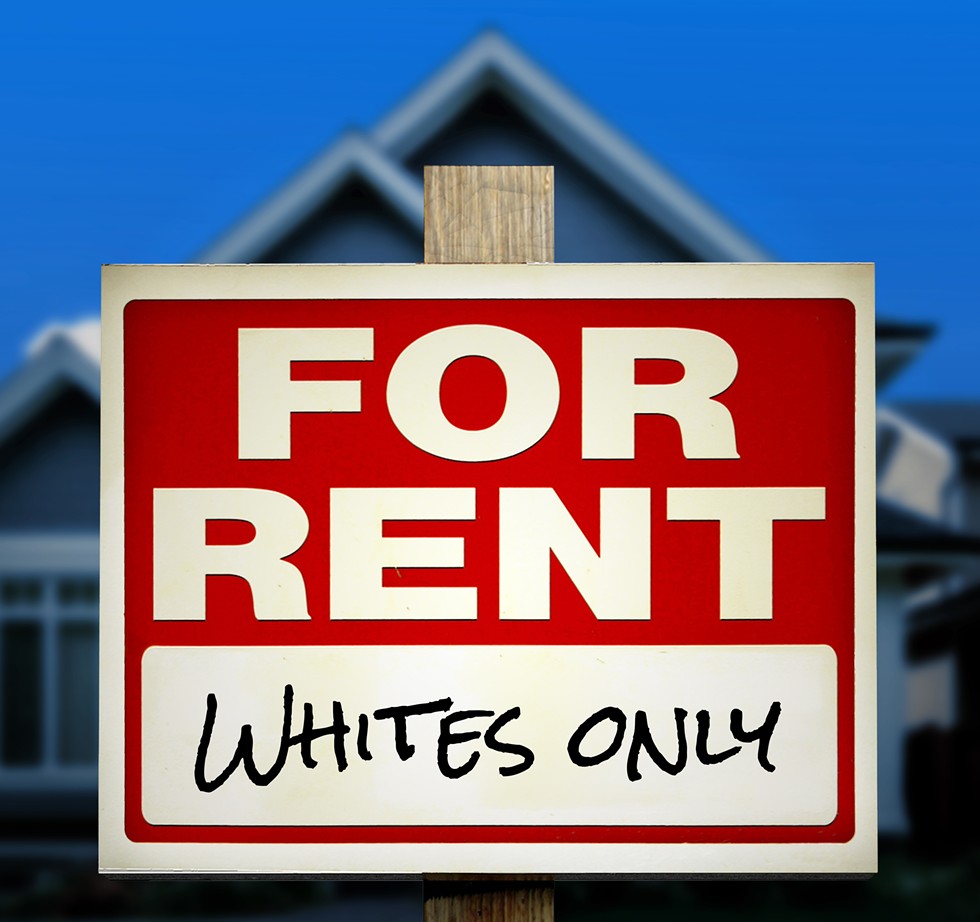The nicest place that Davionna Cousin and her two children have ever called home is the two-bedroom apartment in Richmond Heights where they live now. Cousin says it's big and spacious and a lot better, amenity-wise, than the 15-odd places she checked out before settling there in December.
Cousin had been homeless since 2011, when she was evicted from a Cuyahoga Metropolitan Housing Authority (CMHA) public housing unit on East 30th while working her way through a two-year degree at Cleveland State University. Since then, her housing situation has been piecemeal and often precarious. She stayed periodically with friends and family between stints at the shelter.
For now, though, Cousin's $730 monthly rent is covered in full by a housing voucher from the Emerald Development and Economic Network Inc. (EDEN), one of four entities in Cuyahoga County that administers housing vouchers. CMHA accounts for the vast majority (15,269 out of 16,011, or 95 percent) of them, but EDEN provides a small number, exclusively though agency referrals, as part of its Rapid Rehousing program.
Cousin's voucher is temporary, good for only four months. She is reminded by her EDEN case manager, who visits monthly, that come April she'll be on her own. That's a grim prospect for Cousin, who works part-time at a Dollar Tree and can't seem to get more hours. She wants to work more, and is confident in her skills and credentials — she's got that two-year degree, she says. But it's not doing her much good. Cleveland State won't release her transcript until she pays off nearly $10,000 in student loans.
She speaks about the various perils of her financial situation without the desperation one might expect. When she's asked how on earth she can pay off her student debt, for example, she shrugs.
"It's not a lot. It could be more," she says. "I mean, it's a lot if you don't have any money. But I've been paying them. As soon as I get some money, I just give it to [CSU]. That's my No. 1 right there. That's how important education is to me. That's why I'm in this situation now, because I'm trying to finish what I started."
From 2009 to 2011, when Cousin was a full-time student living on East 30th, she sought and received cash assistance one month. CMHA, believing her financial situation to have changed, started charging her increased rent ($300 per month). That was more than Cousin could afford. She was evicted three months later and still owes the agency about $500. Because of that outstanding debt, she's unable to obtain public housing. She's also unable to get a CMHA voucher after her EDEN voucher expires. That is to say, she won't be able to apply for the lottery. Winners of the CMHA lottery don't get housing vouchers. As in other communities, victory means being placed on a waiting list, where applicants can languish for several years.
(Due to funding limitations, CMHA's voucher waiting list is currently closed to new applicants. And in a 2016 study, about 75 percent of all public housing authority voucher waitlists across the country were found to be closed as well.)
But for now, Cousin has a nice place. It was listed at $790 per month, but EDEN managed to negotiate the rent down to $730, Cousin says. Before landing in her current spot, she says she searched Craigslist and elsewhere, following up on landlords EDEN had provided and seeking out some on her own.
"When I started, I just typed into Google 'apartments for rent,'" she says.
Her housing hunt was a challenge. Many of the prospective landlords she contacted said they wouldn't accept housing vouchers. At least one ruled Cousin out because, at the time, she wasn't employed. Another, in South Euclid, said they didn't accept "people like her" because of a negative past experience. A tenant had reportedly been "too loud."
With EDEN's landlord referrals, Cousin says, there was a quality problem.
"In 90 percent of [the available units]," Cousin says, "the walls were all messed up. They barely passed the [annual CMHA] inspection. I mean the windows opened, but other than that, they just were not good."
Cousin says she ran into similar obstacles all over the county.
"This was not just in the area I'm familiar with," Cousin says, referencing a handful of eastern suburbs. "This was from SOM Center Road to downtown to the west side: People don't accept no vouchers."
***
Like Davionna Cousin — like everyone — participants in Cuyahoga County's Housing Choice Voucher Program (HCVP), would prefer to live in high-opportunity neighborhoods: neighborhoods with low crime, good schools, accessible grocery stores and nearby public transit options.
But the vast majority of them don't. Voucher participants, 90 percent of whom are African-American, tend to be clustered in areas where crime, poverty and environmental health hazards are highly concentrated.
According to a 2017 study by Michael Lepley and Lenore Mangiarelli for the Housing Center, a local fair housing nonprofit, voucher participants are effectively excluded from much of Cuyahoga County.
Participants like Davionna Cousin want to move to better, safer, "quieter" neighborhoods, but they can't. And the biggest reason for their exclusion, in accordance with Cousin's anecdotal evidence: Landlords who refuse to accept vouchers.
Nearly 80 percent of voucher participants surveyed by Lepley and Mangiarelli reported that a landlord's denial was a barrier to their relocation. This was the barrier cited most often, ahead of things like "price" and "security deposit," the second- and third-most common barriers.
Lepley and Mangiarelli concluded that landlord voucher refusals, which are legal in Cuyahoga County and are most pronounced in "high-opportunity neighborhoods," maintain racial segregation in the region, a region that is already among the most segregated in the United States. (The Cleveland-Elyria Metropolitan Statistical Area is ranked fifth in that ignoble category nationwide.)
What's more, the Housing Center study concluded that a key motivating factor for some landlords' voucher refusal is race, and that refusing to accept vouchers was in many cases merely a proxy for race-based housing discrimination.
"Because of these issues, the concentration in Cleveland is extreme," Michael Lepley tells Scene in a conversation about the study. "We have census tracts with 100 percent one race — 100 percent black, 100 percent white. And it's all structural."
To combat the problem, Lepley and Mangiarelli have recommended a county-wide fair housing law that would prohibit voucher discrimination by including "source of income" as a protected class, akin to race, gender or religion. Lepley says he feels that there may be movement on something like this in 2018.
"The right people care about this," he says. "The problem [racial segregation] is so massive, and this wouldn't be the only solution, but it would be one effective tool, one step in the right direction."
***
In order to study landlords, Lepley and Mangiarelli ventured to Craigslist, where roughly 75 percent of local renters turn when they're looking for a new place. Lepley and Mangiarelli were seeking racist-coded language the way others might seek casual sex or gently used tires. They collected every Craigslist rental ad from a given week with the following terms: "section 8, section eight, sec 8, voucher, CMHA, EDEN, government."
Though the "Section 8 Existing Housing Certificate Program," which originated in 1975, is now called the Housing Choice Voucher (HCV) program, "Section 8" has become a racial slur, due to the overwhelming number of participants who are African-American.
Lepley and Mangiarelli created free email accounts using unambiguously gendered, racially identifiable names — "something like Jake or Josh for a white male and DeShawn for an African-American male" Lepley says, citing Freakonomics as the source of the names — and then sent email inquiries to landlords.
Lepley says they always made the first inquiry from an account with an African-American name, attempting to set up a time to see an available unit. They then followed up with an inquiry from a white account within 24 hours. Lepley and Mangiarelli were testing for "unfavorable treatment," which meant:
- The landlord denied housing to one tester by not responding to one while responding to the other, or by offering housing to one tester but not the other.
- The landlord responded to the white tester before the African-American tester, despite the order of the emails.
- The landlord offered one tester lower rent, or other financial incentives.
- The landlord made a greater effort to promote the property to one tester or offered more information to one tester than the other.
Lepley and Mangiarelli did this roughly 100 times with the group of landlords who said their units were unavailable to HCVP participants (the "experiment group"), and about 100 more times with a different group of landlords who had no stated preference in their rental ad. The group with no stated preference served as the "control" group, a term used in science and statistics to represent a baseline, a basis for comparison.
The results demonstrated that some housing providers were indeed using voucher denials as a proxy for race-based discrimination. Among the experiment group (the group of landlords who'd used the specified words in their rental ads), 26 percent of the tests resulted in unfavorable treatment for African-Americans. Only six percent resulted in unfavorable treatment for whites. Among landlords in the control group, 21 percent of the tests resulted in unfavorable treatment for African-Americans; 16 percent resulted in unfavorable treatment for whites.
The tests that resulted in unfavorable treatment for African-Americans (in both the control group and the experiment group) were noticeably clustered in two areas in Cuyahoga County: the west side of Cleveland and Parma.
In an additional test, Lepley and Mangiarelli found that African-American voucher holders were effectively barred from high-opportunity neighborhoods. When the email accounts attempted to set up viewings with landlords in these areas, they were denied or ignored 91.2 percent of the time.
***
Not all landlords who are skeptical of accepting housing vouchers deny them on the basis of race. Indeed, the Housing Center report noted that some housing providers are concerned about potential late payments from the housing authority (almost always CMHA) or about annual inspections that are perceived to be burdensome.
Scott Kroehle is a reform-minded landlord on Cleveland's west side. He tells Scene that he has one tenant in the voucher program, but that he hasn't had any problems in four years.
"Before I had this tenant, my impression of the burden was much larger than the actual burden," he says.
Assuming you keep your properties in decent shape, he says, the inspections are straightforward, and "not a big deal." Moreover, he says, there has never been an interruption in his payment. The portion of the rent covered by CMHA is delivered to him via direct deposit every month.
"Some of my initial reluctance was that the onboarding process for properties not already in the program was pretty long," he says. "It made it a little bit tricky if, on the one hand, I had a renter who was ready to sign a lease for the first of the month, versus a renter where the rent amount may or not be approved based on market standards."
Kroehle says, though, that any impatience with the initial process has been "more than mitigated" by the consistency of his voucher tenant.
"This has been one of my longest tenants at this point," he says. "Most lower-income tenants are cost-burdened [paying more than 30 percent of their income for housing], and just by reducing that pressure [via vouchers], I've had very few late payments because the rent is right-sized."
Beyond that, Kroehle says, even for those landlords who may have negative preconceived notions about voucher tenants, the voucher program itself is a stabilizing influence.
"Eviction has become a fact of life for so many low-income tenants," he says. "And because there's such a long waiting list with vouchers, the Section 8 tenants are highly incentivized to not be evicted. Someone who's been through the eviction cycle might be more cavalier about the threat of another eviction, but the voucher recipient is likely to be more inclined to avoid eviction."
Rosie Tighe is an Associate professor of urban affairs at CSU. She has been researching housing issues, including source of income discrimination, for several years.
When she speaks with Scene, she says she's just finished a grant application to conduct a nationwide "scraping" of Craigslist rental ads, to determine the prevalence of the sort of racism that Lepley and Mangiarelli found locally.
Tighe says that even though source of income legislation would be an important protection for low-income tenants in the region, one major challenge is that the law would be difficult to enforce.
"As far as we know, there's very little enforcement going on," Tighe tells Scene, noting that four suburban municipalities currently have SOI protections in place. "This is largely victim-driven, so a prospective tenant would have to file a complaint and then go through a process, which is different in just about every municipality. We're talking about very low-income households that are desperate for housing. They're probably not going to take the time away from work and spend money on a lawyer to pursue a discrimination lawsuit."
This is one reason why a countywide law would be more effective, Tighe argued, than a piecemeal approach. (Lepley agreed.) It would standardize and streamline a complaint process, and it would make enforcement easier.
"Counties just have much greater capacity," Tighe says. "They can actually create mechanisms, institute some sort of punishment for people breaking the law. That way, you're not relying on small municipalities and their strapped resources."
Short of countywide legislation, Tighe says another major step Cuyahoga County could take to level the playing field would be to institute universal rental inspections.
"Shouldn't every unit be inspected for things like health code violations and building code violations?" Tighe asks. "That's what the CMHA inspections are largely for, to ensure that voucher holders aren't residing in very poor quality housing."
Tighe says that if there were universal inspections, landlords would be less likely to feel that accepting vouchers required going above and beyond.
"Furthermore, it's just common sense," Tighe says. "Having these inspections would elevate the level of housing for everybody."
Despite potential steps forward, like codified source of income protection and universal rental inspections, one thing that the Lepley and Mangiarelli study demonstrated — and that Davionna Cousin's experience corroborated — was the pervasiveness of racism among housing providers.
"We're all culpable," says landlord Scott Kroehle. "The reason we live in the houses we live in is because of a history of racist housing policy facilitated and implemented by the federal government. We need to recognize that. This is an uphill battle, but I think the [Lepley and Mangiarelli] study should speak for itself."
Bearing that in mind, here is where African-American testers received unfavorable treatment from housing providers in Cuyahoga County, per the study:
Parma, Brooklyn Centre, Lakewood, Cleveland Heights, Parma, Clark-Fulton, Cleveland Heights, Shaker Heights, Union-Miles, Jefferson, Edgewater, Detroit Shoreway, Parma, Bellaire-Puritas, Euclid, Shaker Heights, Cleveland Heights, Detroit Shoreway, Cleveland Heights, Old Brooklyn, Cudell, South Euclid, Clark-Fulton, South Euclid, Shaker Heights, Brooklyn Centre, Cudell, Cleveland Heights, Parma, Parma, University Circle, Goodrich-Kirtland, Lakewood, Maple Heights, Cleveland Heights, Lakewood, Parma, Parma, Lakewood, Shaker Heights, Old Brooklyn, Detroit Shoreway, Cleveland Heights, Old Brooklyn, Old Brooklyn, Shaker Heights, Ohio City, Bay Village, Lakewood, North Olmsted ...













